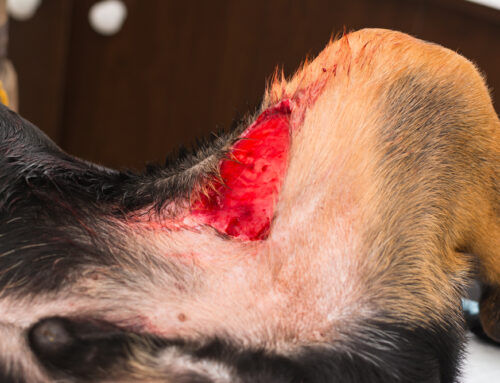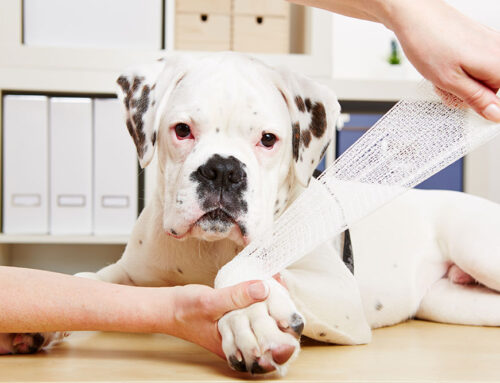Many items found around the home are toxic to pets, and can be life-threatening if your pet ingests one. Our Alpine Animal Hospital team is devoted to keeping your pet happy and healthy, and we provide information about common pet toxins and steps you should take if your pet is affected.
Human over-the-counter medications can be toxic to pets
People commonly use over-the-counter (OTC) medications to alleviate headaches and treat allergy and cold symptoms, but many of these medications are toxic to pets, including:
- Acetaminophen — Pets metabolize acetaminophen differently than humans, and only small amounts can be toxic. Cats are especially sensitive to acetaminophen poisoning and can be affected by extremely low doses. Acetaminophen toxicity causes liver damage and decreases the red blood cell’s ability to carry oxygen. Signs include inappetence, rapid breathing, panting, and vomiting or drooling.
- Nonsteroidal anti-inflammatories (NSAIDs) — NSAIDs work by blocking an enzyme called cyclooxygenase that helps produce inflammatory chemicals called prostaglandins. However, cyclooxygenases in certain body parts are necessary for normal body functions. Certain NSAIDs inhibit cyclooxygenases throughout the body, including those that protect the stomach lining and supply blood to the kidneys. Pets are more sensitive to NSAIDs, and ingestion can lead to stomach ulceration and kidney failure. Signs include diarrhea, vomiting, and lethargy. Collapse, coma, and seizures can occur in pets who eat large amounts.
- Decongestant medication — Many decongestants contain phenylephrine and pseudoephedrine, which stimulate the nervous and cardiovascular systems. Signs include restlessness, agitation, increased heart rate, hyperthermia, panting, and muscle tremors.
Human prescription medications can be toxic to pets
Common human prescription medications that are toxic to pets include:
- Antidepressants — Antidepressants affect neurotransmitters in the brain, and at the appropriate dose, can be helpful for humans and pets. However, when too much is ingested, excessive excitatory effects can occur, resulting in cardiac and neurologic issues. Signs include changes in mental status, muscle tremors, seizures, and cardiac arrhythmias.
- Attention deficit hyperactivity disorder (ADHD) medication — ADHD medications are strong stimulants, and low doses can result in issues such as tremors, seizures, dangerously elevated heart rates, and hyperthermia.
- Blood pressure medication — Beta blockers are a class of blood pressure medication with only a narrow safety margin in pets, and a small amount can result in heart failure, severe hypotension, and acute kidney failure. Signs include vomiting, weakness, and collapse.
Human food can be toxic to pets
Many items found in your kitchen can be toxic to pets, including:
- Chocolate — Commonly listed as one of the most common pet toxins, chocolate contains caffeine and theobromine, which pets can’t metabolize well. These ingredients act as a diuretic, heart stimulant, blood vessel dilator, and smooth muscle relaxant. Signs include diarrhea, vomiting, panting, restlessness, and increased heart rate. In severe cases, signs can include muscle tremors, seizures, and heart failure.
- Xylitol — Xylitol is an artificial sweetener commonly found in sugar-free gums, mints, and baked goods, as well as some dental products. Xylitol triggers the release of a large amount of insulin by the pet’s pancreas, which causes a sudden, excessive drop in blood sugar. Liver damage can also occur. Signs include vomiting, weakness, incoordination, lethargy, seizures, and collapse.
- Grapes and raisins — Grapes and raisins contain a toxin, potentially tartaric acid, which can cause kidney failure in pets. Signs include vomiting, diarrhea, lethargy, and excessive thirst and urination.
- Onions and garlic — These vegetables contain a toxic substance called N-propyl disulfide that breaks down red blood cells, leading to anemia. Signs include lethargy, vomiting, panting, pale gums, reddish urine, and fainting.
Plants can be toxic to pets
Several plants found in and around your home can be toxic to pets, including:
- Lilies — Lilies can cause gastrointestinal (GI) upset in dogs, and can be fatal for cats. All lily parts, including the vase water, are dangerous, and ingestion can lead to severe kidney failure. Signs include lethargy, drooling, vomiting, and increased thirst and urination.
- Dieffenbachia — Also known as dumb cane, this plant contains calcium oxalate crystals, which can penetrate and irritate the oral tissues and the GI tract. In some cases, the upper airways can also be affected, leading to difficulty breathing. Signs include drooling, pawing at the mouth, inappetence, and vomiting.
- Oleander — Oleander is a popular ornamental garden plant that is toxic to pets. The plant contains cardiac glycosides that disrupt cardiac function. Signs include vomiting, diarrhea, arrhythmias, and blood pressure changes.
Pet toxicity first aid

If you know or suspect your pet has ingested a toxin, steps include:
- Taking the toxin away from your pet to ensure they don’t ingest more
- Saving the label, if possible, to relay product information
- Calling Alpine Animal Hospital or Animal Poison Control immediately for advice
- Having the following information ready:
- Your pet’s breed, sex, age, and weight
- Signs
- Substance your pet ingested, including the concentration
- Time the substance was ingested
- Amount of substance ingested
- Not inducing vomiting unless directed by your veterinarian
Knowing the items around your home that are toxic to pets can help you safeguard your four-legged friend. If your pet is exposed to a toxin, contact our Alpine Animal Hospital team as soon as possible, so we can determine how best to address the situation.







Leave A Comment